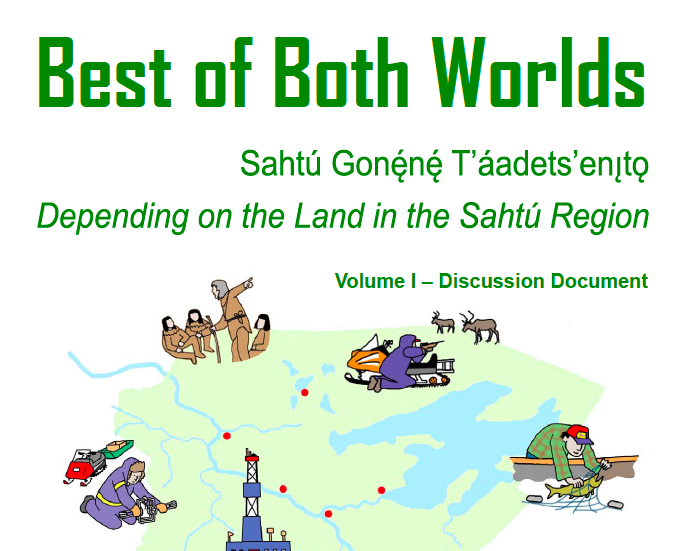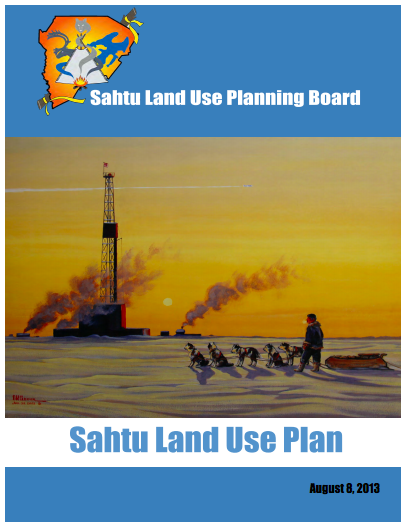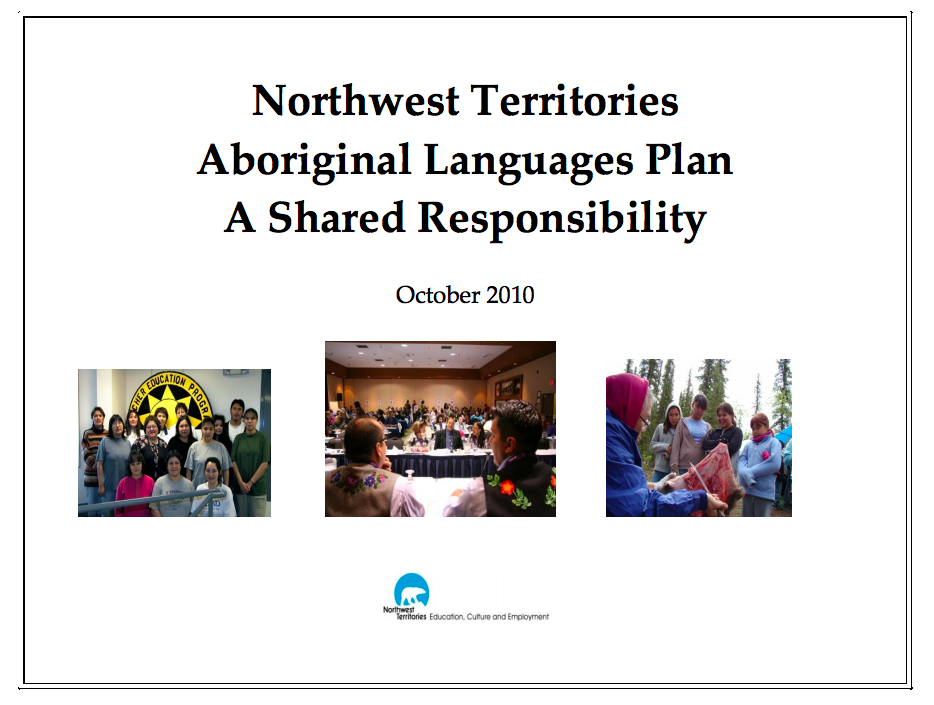Best of Both Worlds: Sahtú Gonę̨̨́nę́ T’áadets’enıt̨ǫ – Depending on the Land in the Sahtú Region
Best of Both Worlds was a project sponsored by the SRRB that lead to the development of an action plan for a traditional economy in the Sahtú Region.
The Best of Both Worlds project is described in greater depth on its own section of the SRRB website, where the full PDF is also available.
Access this Resource:
Harnum, Betty, Joseph Hanlon, Tee Lim, Jane Modeste, Deborah Simmons, and Andrew Spring with The Pembina Institute. Best of Both Worlds: Sahtú Gonę́nę́ T’áadets’enı̨tǫ, Depending on the Land in the Sahtú Region. Tulıt’a: Ɂehdzo Got’ı̨nę Gots’ę́ Nákedı, Sahtú Renewable Resources Board, 2014.
Sahtú Land Use Plan
The Sahtú Land Use Plan is the culmination of all of the mapping, consultation, and research that went into outlining the activities appropriate for the Sahtú Settlement Area following the SDMCLCA. The plan discusses conservation and development, and does not restrict or direct harvesting of Sahtú Dene and Métis. It pays special attention to the socio-cultural as well as the economic wellbeing of Sahtú residents, focusing on water resources as well as land use.
Access this Resource:
The Land Use Plan is available to the public on the Planning Board website.
Sahtú Land Use Planning Board. Sahtú Land Use Plan.Fort Good Hope, 2013.
Annual Report on Official Languages 2011-2012
Every fiscal year, the Government of the Northwest Territories issues a record of measures taken to implement the Official Languages Act. Each report details developments in both French and Aboriginal language programming. Many programs focus on connecting youth with elders, training teachers, developing curriculum, and providing government services in as many languages as possible.
In 2011-2012, the Sahtu Members of the NWT Official and Aboriginal Languages Boards were Theresa Etchinelle and Dora Grandejambe, with an alternate of Ann Kochon Orlias.
Access this Resource:
The Government of the Northwest Territories makes reports from the last decade available here: https://www.ece.gov.nt.ca/en/services/francophone-affairs-secretariat/official-languages-annual-reports
Government of the Northwest Territories. Annual Report on Official Languages. Yellowknife: 2012.
Annual Report on Official Languages 2010-2011
Every fiscal year, the Government of the Northwest Territories issues a record of measures taken to implement the Official Languages Act. Each report details developments in both French and Aboriginal language programming. Many programs focus on connecting youth with elders, training teachers, developing curriculum, and providing government services in as many languages as possible.
Access this Resource:
The Government of the Northwest Territories makes reports from the last decade available here: https://www.ece.gov.nt.ca/en/services/francophone-affairs-secretariat/official-languages-annual-reports
Government of the Northwest Territories. Annual Report on Official Languages. Yellowknife: 2011.
Enhancing Aboriginal Participation in Northern Land Use Planning
From Abstract:
In the Northwest Territories (NWT), land claims created tripartite co-management boards, a power-sharing mechanism between Aboriginal organizations, territorial, and federal governments. Land use planning is overseen by such boards and is intended to be a community driven process but Aboriginal organizations and communities have difficulty participating at the same level as their government counterparts. The Great Bear Rainforest (GBR) agreement in British Columbia was considered as a "success" case study on Aboriginal participation in land use planning. Interviews with Aboriginal leadership and non-Aboriginal resource people were conducted in the GBR, the Dehcho and Sahtu for "lessons learned", and to identify ways to create enabling conditions for Aboriginal participation. Three spheres of influence were identified. Aboriginal leadership can create enabling conditions by influencing the technical planning process, exhibiting strong leadership and by adopting good governance practices and structures.
Access this Resource:
Collections Canada has made this resource available for free online.
Mak, Ida. Enhancing Aboriginal Participation in Northern Land Use Planning. Master’s Thesis, Royal Roads University, 2011.
Annual Report on Official Languages 2009-2010
Every fiscal year, the Government of the Northwest Territories issues a record of measures taken to implement the Official Languages Act. Each report details developments in both French and Aboriginal language programming. Many programs focus on connecting youth with elders, training teachers, developing curriculum, and providing government services in as many languages as possible.
One important excerpt from the 2010 report:
“In the latter part of the 1990s, the Department of Education, Culture and Employment (ECE) consulted with communities on a variety of issues while developing its long-term strategic plan. As a result, a Strategic Plan for Aboriginal Languages was developed through the document: “Revitalizing, Enhancing and Promoting Aboriginal Languages: Strategies for Supporting Aboriginal Languages”. This document outlined what the GNWT was currently doing and planning to do to support the vision of healthy Aboriginal languages. The document was intended to be a “work in progress‟ and modified as Aboriginal language communities continued to articulate their needs, define their priorities and take greater responsibility for achieving their language goals…
The contract for the Review of the Strategy for Supporting Aboriginal Languages of the NWT was awarded to the Genesis Group of Yellowknife. The final Report was submitted in November 2009. The recommendations and information from this Report forms part of the development of a GNWT Aboriginal Languages Strategy.” (4)
Access this Resource:
The Government of the Northwest Territories makes reports from the last decade available here: https://www.ece.gov.nt.ca/en/services/francophone-affairs-secretariat/official-languages-annual-reports
Government of the Northwest Territories. Annual Report on Official Languages. Yellowknife: 2010.
Northwest Territories Aboriginal Languages Plan: A Shared Responsibility
The NWT Language Plan was developed collaboratively, using the results of a 2010 language symposium. Its vision statement reads: "Aboriginal languages are used extensively, on a daily basis, to communicate in NWT homes and communities, as well as within the organizations and agencies providing services to the public." (7) This report counts 1,167 people able to converse in Sahtú Dene Kedǝ, with an age distribution better balanced than some other language communities. For the Sahtú region, a few key challenges are identified: the value parents place on dominant languages, communications and technology (most media are available in English and French), Residential School legacy, different dialects (purism impacting language learning), and collaborating across so many different organizations and people.
Access this Resource:
The Government of the Northwest Territories has made this report available on their website: http://www.assembly.gov.nt.ca/tabled-documents/northwest-territories-aboriginal-languages-plan-shared-responsibility.
Government of the Northwest Territories. Northwest Territories Aboriginal Languages Plan: A Shared Responsibility. Yellowknife, 2010.
People, Land, and Pipelines: Perspectives of Resource Decision Making Processes in the Sahtu Region, Northwest Territories
From Abstract:
This dissertation examines the ways in which three Aboriginal communities in the Sahtu Region of the Northwest Territories are participating in decisions and activities related to non-renewable resource extraction on Sahtu lands.
Carly Dokis' dissertation was later turned into a book, Where the Rivers Meet. Read about the book and access the Google Book preview on its own item page in this catalogue.
Access this Resource:
Read the dissertation on the Collections Canada website.
Read the dissertation from the University of Alberta online repository.
DOI: https://doi.org/10.7939/R3H12M
Dokis, Carly A. People, Land, and Pipelines: Perspectives of Resource Decision Making Processes in the Sahtu Region, Northwest Territories. Doctoral Thesis, University of Alberta, 2010.
Final Report on the Review of the Official Languages Act 2008-2009, Reality Check: Securing a Future for the Official Languages of the Northwest Territories
The Standing Committee on Government Operations evaluated the Official Languages Act. The Committee encountered a number of key concerns during the hearings they held for this review. The lack of an implementation plan for the OLA, along with an absence of regulations, meant that standards for OL services were inconsistent and inaccessible to the public. Aboriginal languages speakers identified inequalities in support for French and their own languages, and a lack of communication between Aboriginal language communities and the NWT. The Aboriginal Languages Board did not succeed in bridging this gap.
Other challenges identified included:
- A lack of Interpreter/Translators in the health and justice systems, need for increased terminology development
- A lack of accountability for Government commitments
- A widening intergenerational communication gap
- Under resourced Aboriginal languages curriculum development
- Insufficient languages instruction, insufficient funding, resources, and training for instructors
- Funding for community languages programs is inconsistent, minimal, and causes interruptions in programs, prevents expansion, does not consider needs fairly, does not allow for year-round programming, and is inaccessible (information is difficult to find).
The committee also named some improvements, mostly stemming from the department of Education, Culture, and Employment:
- language nest program introduction
- Dene Kede curriculum implementation
- progresses in teacher training
One section of the report describes a meeting with Sahtú community members in Délı̨nę, 2008. Representatives emphasized on the land language and culture communication, and called for compulsory Aboriginal language instruction. They also commented that Dene Kede curriculum should be supported by Divisional Education Councils, and that school staff needed more support and training to use the curriculum properly. They also identified the challenge of having many fluent speakers without teaching certification, and the challenge of certified Dene teachers using English as a primary language. They called for more funding, more community involvement, and they did not know who the Languages Commissioner was or what their mandate and activities might be. They also requested more access to Interpreter/Translators (and training for them) particularly in the Justice system. (61-63)
In addition, the report contains some comments on Dene Kede curriculum from various study participants, replicated here.
- Tłįchǫ̨ delegates say their Language Centre really helped with implementing Dene Kede curriculum. They developed cultural resource kits, worked with teachers, developed teaching materials for different units, and run a one-week on-the-land orientation for new teachers. (55)
- Sahtú Delegates: Dene Kede needs more support from DECs.
- Summary (all): Lack of resources, supporting materials for Dene Kede implementation (75)
Access this Resource:
The Legislative Assembly of the Northwest Territories has made this resource available on their website.
Standing Committee on Government Operations, Legislative Assembly of the Northwest Territories. Final Report on the Review of the Official Languages Act 2008-2009, Reality Check: Securing a Future for the Official Languages of the Northwest Territories. Committee Report 6-16(3), Tabled May 28, 2009.
Annual Report on Official Languages 2008-2009
Every fiscal year, the Government of the Northwest Territories issues a record of measures taken to implement the Official Languages Act. Each report details developments in both French and Aboriginal language programming. Many programs focus on connecting youth with elders, training teachers, developing curriculum, and providing government services in as many languages as possible.
Access this Resource:
The Government of the Northwest Territories makes reports from the last decade available here: https://www.ece.gov.nt.ca/en/services/francophone-affairs-secretariat/official-languages-annual-reports
Government of the Northwest Territories. Annual Report on Official Languages. Yellowknife: 2009.





 Phone: 867-374-4040
Phone: 867-374-4040 Email:
Email: